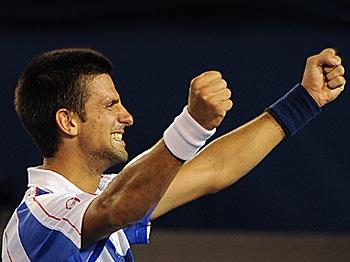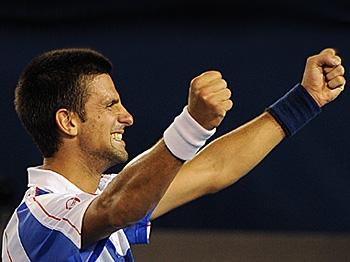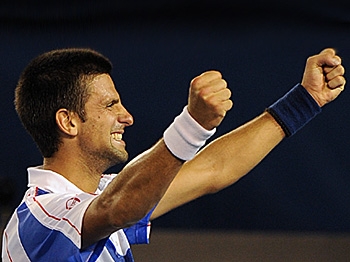Novak Djokovic, after defeating Roger Federer in straight sets in the semi-finals, dispatched a seemingly tired and confused Andy Murray in the same fashion, 6–4, 6–2, 6–3 Sunday evening to win his second Australian Open championship.
If the era of the dominance of Federer and Nadal is ending, Novak Djokovic showed himself ready to step up as a worthy successor.
Djokovic displayed his championship form in his award acceptance speech, trying to ease the sting he knew his opponent must feel after such a complete defeat.
“I want to congratulate Andy for a great two weeks,” the 23-year-old Serb told ESPN. “We’ve know each other for such a long time—it was really difficult to play against you. Tonight was a tough one—hopefully you will have another chance to win many Grand Slams. I’m sure, with your talent, you will.”
After thanking the sponsors, the organizers, and his team, Djokovic turned to a more serious topic. “I would just like everybody to remember the victims of the floods these two weeks,” he requested. “Of course we try to contribute as much as we can. Just a little gesture of remembering those people who suffer a lot—you are not alone.
“In the end, I dedicate this title to to my family, my brothers, my girl Elena back home,” he continued. “There’s been a tough period for people in Serbia, but we’re trying every single day to present our country in the best possible way—so this is for my country, Serbia. Thank You.”
Djokovic started the match looking like a winner, and never faltered or even seemed to acknowledge pressure.
The rangy Serb was in top form, moving effortlessly and blasting shots at impossible angles; he looked every bit a Grand Slam champion.
His opponent, in sharp contrast, seemed listless and unfocused; Murray seemed to move awkwardly, hit more than twice as many errors as winners, and seemed not to believe he could win from early in the first set.
Djokovic served strongly, scoring on 70 percent of his first serves and 60 percent of his second serves. More important, he seemed calm and confident from the start, winning his first service game at love, and battling Murray to five deuces in Murray’s first service game.
The match featured several 30- and 40-stroke rallies, with plenty of good tennis from both players. Djokovic’s greater shot-making and vastly better net play tilted most of these rallies in his direction.
Murray grew visibly more frustrated and angry as the match progressed, yelling at himself, glaring at Djokovic’s box, and looking harassed and worried. Despite his considerable skills, Murray didn’t have the mental skills to prepare for the match, or to turn it around once it started slipping away.
Djokovic on the other hand, attacked at every opportunity, without doubt or worry. In several games when he had two or three break points, he converted on the first opportunity; he raised his game when he had a chance to make a difference. The 23-year-old Serb demonstrated the ability to use his mind as well as his body to seize the decisive points.
If the era of the dominance of Federer and Nadal is ending, Novak Djokovic showed himself ready to step up as a worthy successor.
Djokovic displayed his championship form in his award acceptance speech, trying to ease the sting he knew his opponent must feel after such a complete defeat.
“I want to congratulate Andy for a great two weeks,” the 23-year-old Serb told ESPN. “We’ve know each other for such a long time—it was really difficult to play against you. Tonight was a tough one—hopefully you will have another chance to win many Grand Slams. I’m sure, with your talent, you will.”
After thanking the sponsors, the organizers, and his team, Djokovic turned to a more serious topic. “I would just like everybody to remember the victims of the floods these two weeks,” he requested. “Of course we try to contribute as much as we can. Just a little gesture of remembering those people who suffer a lot—you are not alone.
“In the end, I dedicate this title to to my family, my brothers, my girl Elena back home,” he continued. “There’s been a tough period for people in Serbia, but we’re trying every single day to present our country in the best possible way—so this is for my country, Serbia. Thank You.”
Strong From the Start
Djokovic started the match looking like a winner, and never faltered or even seemed to acknowledge pressure.
The rangy Serb was in top form, moving effortlessly and blasting shots at impossible angles; he looked every bit a Grand Slam champion.
His opponent, in sharp contrast, seemed listless and unfocused; Murray seemed to move awkwardly, hit more than twice as many errors as winners, and seemed not to believe he could win from early in the first set.
Djokovic served strongly, scoring on 70 percent of his first serves and 60 percent of his second serves. More important, he seemed calm and confident from the start, winning his first service game at love, and battling Murray to five deuces in Murray’s first service game.
The match featured several 30- and 40-stroke rallies, with plenty of good tennis from both players. Djokovic’s greater shot-making and vastly better net play tilted most of these rallies in his direction.
Murray grew visibly more frustrated and angry as the match progressed, yelling at himself, glaring at Djokovic’s box, and looking harassed and worried. Despite his considerable skills, Murray didn’t have the mental skills to prepare for the match, or to turn it around once it started slipping away.
Djokovic on the other hand, attacked at every opportunity, without doubt or worry. In several games when he had two or three break points, he converted on the first opportunity; he raised his game when he had a chance to make a difference. The 23-year-old Serb demonstrated the ability to use his mind as well as his body to seize the decisive points.






